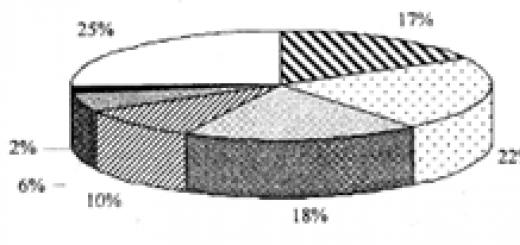Most Russians honestly pay taxes. The taxation system in Russia is very loyal compared to other countries. The income tax rate (personal income tax) in the United States can reach 41.9%, in the UK and Japan - 50%, in developed European countries, the population has to give the state an average of 25-35% of their income, but sometimes it comes to 60% - that's how much, for example, Danish millionaires pay. And even in developing countries the personal income tax rate is sometimes 15-20%: for example, in India - 10-30%, in Mexico - up to 28%, in Brazil - 15-27%.
This article is a reference and information material, all the information in it is presented for informational purposes and is for informational purposes only.
In Russia, the income tax rate is 13%. A citizen who owns an apartment, a summer house and a car also pays a tax on the property of individuals, land and transport taxes. And employers deduct funds for us in Pension Fund, Foundation social insurance and the Mandatory health insurance: these payments, of course, do not reduce the salary, but perhaps it would be higher if there were no these duties.
And since 2014, the authorities are going to introduce new tax for real estate. In reality, however, he will earn no earlier than 2015. The tax will be calculated from cadastral value real estate, which is closer to the market.
The approximate rate for residential premises will be 0.1%. Thus, if today you have to pay about 600-1000 rubles for the possession of a standard Moscow kopeck piece. per year, then after the introduction of new rules, the tax will reach 5-8 thousand rubles. in year. Compared to other countries, this is not so much. For example, in Germany the property tax rate ranges from 1 to 2.1%, in Sweden - from 0.5 to 1.3%, in Japan and the USA - 1.4% (however, in the USA the tax is calculated from an amount equal to 75% of the property value), and in Spain, where the property tax is considered to be gentle, - 0.3-0.4%.
In theory, taxpayers should rely on the state to provide them with all kinds of services, for example, provide the country with good roads, and our youth with free higher education. In principle, you can give away half of your income if you get free high-quality medicine, comfortable cities, benefits for buying a home, and a decent pension. In many countries with a high level of taxes, all this is available, while in Russia the spending of budget funds from year to year raises serious doubts and few people clearly understand where our taxes go.
To find out if citizens know how the property tax will change, for what purposes it will be spent, and how taxes are spent in general, "" decided to conduct a sociological study.
Question “Do you know what the taxes you pay are used for?” 48.6% of respondents answered in the affirmative, and only 22.3% admitted that they had no idea about this:
It is curious that the percentage of those who found it difficult to answer is quite high, it is 29.1%: in general, people imagine for what purposes taxes should be directed, but they do not know whether they are used for their intended purpose.
Somewhat surprised by the result of the answer to next question- that do people know there will be a real estate market tax . Despite the fact that active talks about this have been going on for at least the last couple of years (and the topic has been discussed for about 15 years), 76.7% of respondents answered that they had heard about it for the first time, and only 20.4% of respondents said they had heard about this initiative:

But at the same time, even those citizens who heard about the introduction of a market tax on real estate turned out to be not very knowledgeable. Only slightly more than half of them (about 10% of the total number of respondents) are aware that the future tax is going to be directed to the needs of the municipality where taxpayers live. That is, for the improvement of courtyards, lighting, gardening, construction and modernization of local roads, repair of hospitals, schools, etc.
Then the respondents were asked what kind of services they would like to receive from the state as taxpayers.
17.5% of the respondents expressed their opinion for good medicine : “First of all, we need quality medical services”, “free medicine is needed” and “qualified treatment”.
In the same size group - 17.5% said they would be happy if their taxes went for the beautification of the city : “we need to make more normal sidewalks”, “we need benches for the elderly”, “we need to spend money on roads and laying noise-absorbing asphalt”, “funds are needed to build and improve schools and kindergartens”, “to repair playgrounds”, “to small convenience stores and development public transport"," It is important to ensure safety so that children are not afraid to let go for a walk, "I want clean yards, so that they do not resemble parking lots, so that it is clean in the entrances and everything functions."
9.7% of respondents would like to see prosperous social sphere : "children's education", "adequate children's allowances", "pensions", "orphanages", "teachers' salaries".
41.7% - could not decide what to spend the funds received in the budget, recognizing the issue as very complicated, and themselves not competent enough.

But of course, there were also dissatisfied citizens among the respondents, they made up the group of 7.8%. These people doubted that taxes were spent honestly, even mockingly remarking that "of course, taxes should go into the pockets of officials." But they noted that the main thing is that the taxes reach the goal safely: "if the money is not stolen, then everything will be as it should be."
They also talked about the fact that it is not worth introducing a market tax on real estate, "because I know how much they steal."
And 3.9% of the respondents generally admitted that it would be better if there were no taxes at all: “the less taxes, the better,” “I don’t want to receive anything from this state and I don’t want to give anything.”
So, half of the respondents generally imagine what the funds collected from tax revenues are spent on. Among the main services that the state should provide to taxpayers, people named high-quality medicine, the creation of a comfortable urban space and a prosperous social sphere.
At the same time, only one in five knows that the authorities are going to introduce a market tax on real estate, and only 10% are aware that the real estate tax should go to the local budget and be spent on creating a comfortable environment for people living in this region. municipality(district). That is, in fact, this is the very convenient urban space that people would like to see, and which can be formed thanks to the real estate tax.
Not too brilliant awareness of citizens about the upcoming changes in tax legislation, perhaps due to the fact that talks about the property tax have been going on for a long time, and things are still there. Therefore, there is clearly a fatigue from this topic. At the same time, people's irritation is felt, it is easy to track it by the tone and content of their comments. They do not have much faith in the good intentions of the state, especially when it comes to the public good.
The data was obtained by the magazine using a telephone survey conducted on a representative sample. It allows you to reflect the opinion of the population of an arbitrarily large city and maintain the ratio of sex and age of respondents, depending on the population in . The survey involved residents of the city of working age.
Federal tax service Russia will become the main state employer in 2017
The Federal Tax Service of Russia will become the main state employer in 2017.
Against the background of the crisis in the field of employment, the Federal Tax Service of Russia intends to open as many as 11,850 new vacancies (!) in the coming year. New employees will be given a logical task: to collect as many taxes as possible and to identify as many evaders as possible. More and more clearly, the civil service in the Federal Tax Service is acquiring a smack of ... commercial.
The system and its diseases
You have to pay taxes. This is the normal practice of a civilized society. A state without taxes can exist, but then absolutely any service, any certificate, any call to the police, any landscaping of the yard, every lesson at school will be paid for citizens. The poor, the weak (and there are such in any society) will die of hunger if charitable foundations do not come to them. Science will be private, that is, most likely, it will not exist at all. Yes, and in this strange society, you still have to deduct something for the maintenance of the army - according to the well-known saying, if not your own, then someone else's.
However tax system Russia, to put it mildly, is imperfect. With a huge gap in income levels, we still have a flat scale of taxation of individuals - and this, for a second, is the main income of Russian regions. The argument is that with the introduction of a progressive scale (the more you get, the more interest you pay), rich people will hide their income. The question is - why do we then have the Federal Tax Service with its 11,850 new employees? Hiding a billion-dollar deal is much more difficult than 600 rubles for an oil change in a car. And to reveal it is very simple - there would be a desire.
The actual paralysis of the state administration of Russia, the embezzlement of public funds introduced into the custom, widespread nepotism (the appointment of professionally unsuitable relatives of “necessary people” to serious positions) could not but lead to the formation of an alternative economy. It is with her, among other things, that the new employees of the Federal Tax Service will fight - and it is very likely that along with the water (tax arrears) the child will be thrown out (unfortunate Russian business).
Taxes, contributions, fees
Let's see where our money goes.
Tax and non-tax (primarily customs) revenues account for more than 90% of the revenue part of the federal budget of Russia, the rest is gratuitous revenues.
Russia's main income is oil and gas: the mineral extraction tax (MET) and customs duties in 2016 were supposed to give 6 trillion rubles. out of 13.7 trillion total budget revenues. Together with the value added tax (VAT, 4.4 trillion rubles), which is likely to be raised in the coming years, these funds provide the lion's share of the federal budget.
But regional budgets are formed primarily from a variety of corporate taxes, road tax, as well as from everyone's favorite personal income tax (personal income tax); since 2016, the real estate tax (reformed land tax). Let's look at the example of the underdeveloped Tambov region in 2015 - personal income tax gave 45% of revenues to the local budget, income tax - 25.6%, tax on total income - 6.8%.
Considering the underdevelopment of business and the absolute dependence of the country on oil and gas revenues, it is easy to understand why more than 80% of the regions receive more from the federal budget than they transfer there. Let's say that the same Tambov region keeps 4 times more funds from its taxes and fees than it transfers to the federal budget, and it still lacks. The federal “subsidy for equalizing budgetary security” is almost twice as much as Tambov’s payments to the state, but this is also not enough: the region’s public debt already exceeds half of its annual collections, while more than 70% of this debt is a commercial part. Incidentally, this is a rarity: regions often prefer to borrow from the state budget. It is becoming more and more difficult to repay debts: it is now clear that, in fact, the Russian regions are insolvent debtors. At the same time, our state is more willing to write off debts to Cuba and Angola than to Orenburg and Kirov.
We figured out the income, but what about the expenses? Every year they become more and more classified, in 2017 it is 24% of the state’s spending, not only under the “National Defense” item, but also, for example, under the “Culture” item. In general, the state really functions with our money - it maintains the state apparatus (the share of expenditures on it is also growing), the army, the police, the education system, partly medicine, and much, much more. All the improvement that still takes place in our cities and villages is also paid for through our taxes.
In addition to taxes, there are other wonderful entities - contributions with fees. For example, when the government loudly announced a moratorium on tax increases, Moscow immediately raised the trade tax - and what, this is not a tax, but a "local payment". Contributions from the salaries of citizens go to three fund systems - Pension funds (22% of salaries), CHI funds(5.1%) and social insurance funds (2.9%). Since 2017, the administration of these hidden taxes has been transferred to the Federal Tax Service, and the word “contribution” has completely lost its meaning. It's funny that the percentage of contributions to the Pension Fund decreases with salary growth - that is, the head of the Federal Tax Service, Mikhail Mishustin, pays a smaller share of his income there than you, dear reader from the middle or "half-middle" class.
Isn't it time for a laugh?
All this is not surprising - when very rich people make laws, for some reason there are more and more very poor people in the country. There is a wonderful Chinese parable on this subject.
A certain emperor of one of the ancient dynasties said to his officials:
My subjects live too well! They are cheerful and happy, laughing and dancing, which means they have a lot of money, but I have little in the treasury. Increase taxes.
After the tax increase, he sent officials to check the situation on the streets.
What are my subjects doing on the streets? the emperor asked the ministers.
They lament and lament, my lord.
So they still have a lot of money. Increase taxes.
Taxes have increased again.
What are my subjects doing now? the emperor asked.
They lament, cry bitter tears and beg for mercy, sovereign.
So they still have money! Increase taxes!
Increased.
What are my subjects doing now? the emperor asked.
They weep, curse fate and tear their hair out.
So they still have something left. Increase taxes!
And again the officials took to the streets to look.
But now, now what are my subjects doing?
For some reason your subjects are laughing and dancing, my lord.
Here. - said the emperor. Now they really have nothing left.
What stage do you think we are at now?
All owners of cars and other vehicles that meet special criteria are required to pay a vehicle tax. Its value depends on a large number of different factors.
Dear readers! The article talks about typical ways to solve legal issues, but each case is individual. If you want to know how solve exactly your problem- contact a consultant:
APPLICATIONS AND CALLS ARE ACCEPTED 24/7 and 7 days a week.
It's fast and IS FREE!
Moreover, payment is made not only individuals but also legal.
The concept of the term
In connection with the legislative reform carried out at the beginning of the 2000s, the funds raised can be spent on almost anything:
- road industry;
- on the wages state employee;
- construction of objects important for the regions.
Often, this is what worries car owners - with a sufficiently large transport tax, it is likely that all the funds will go not to laying asphalt, to something else.
What does the law say
All points related in one way or another to the transport tax are necessarily covered in the legislation:
- - means a complete list of all categories of physical and legal entities liable to pay the tax of the type in question;
- – considers the procedure for calculating the amount of transport tax for legal entities;
- - a complete list of equipment is indicated, the owners of which must pay a transport fee;
- - the term of payment is indicated;
- - the largest taxpayers are required to provide a properly drawn up declaration, which reflects the tax of the type in question;
- - cases are indicated in the event of which the obligation to pay transport tax is abolished.
The very fact of the distribution of tax collection on vehicles directly regulated by the municipality Art. 14 of the Tax Code of the Russian Federation and Art. 56 BC RF.
It is according to the information of the RF BC that the entire transport tax (in the amount of 100%) goes to the regional budget and is distributed by it for various needs at its own discretion.
Where is the car tax money spent?
It is rather problematic to determine what exactly the funds collected in the form of transport tax will be spent on.
Thus, in many regions, the authorities continue to form road funds, into which certain injections are made from the budget.
But the amount of revenue is often simply not large enough to keep the road industry even in a satisfactory condition, let alone more.
Moreover, the authorities are not particularly willing to report on the funds spent on the restoration of the roadway. Since in most cases, patching holes in the budget is carried out at the expense of the transport tax.
For example, in the Volgograd region in 2020, about 2 billion rubles were withdrawn from the budget of the road fund for various needs that were in no way related to the target infrastructure.
In 2020, this amount increased by 2.6 billion rubles. Thus, at the moment the budget deficit of the road fund is as much as 8 billion rubles.
At the same time, the value of the fund's budget is constantly increasing, but at the same time, expenses are proportionally growing. As a result, the deficit, as before, continues to be approximately 8 billion rubles.
The situation is similar in almost all other regions of the country - with a few exceptions.
Nevertheless, there is a positive trend, an increasing number of regions are beginning to become concerned about the problems of the road industry.
Payment statistics by region
The value of the fee under consideration varies greatly depending on a wide variety of parameters. First of all, this is the cost of the car, the amount of horsepower, as well as the age of the vehicle.
But at the same time, the region where the car is located has a significant impact. Understanding is quite difficult.
Since there is a “luxury tax” (for a car more than 3 million rubles) and many other, quite important, nuances.
Yes, all regions Russian Federation by the amount of tax collected in 2020 for the previous reporting period can be arranged as follows (in descending order):
| Number | Region of the Russian Federation |
| 1 | Kaliningrad region |
| 2 | Tomsk region |
| 3 | Belgorod region |
| 4 | Petersburg |
| 5 | Primorsky Krai |
| 6 | Smolensk region |
| 7 | Arkhangelsk region |
| 8 | Khabarovsk region |
| 9 | Moscow |
| 10 | Tyumen |
| 11 | Novosibirsk |
| 12 | Penza |
| 13 | Vladimir region |
| 14 | Ulyanovsk region |
| 15 | Ivanovo region |
| 16 | Kursk region |
| 17 | Yaroslavl region |
| 18 | Kaluga region |
| 19 | Orenburg region |
| 20 | Republic of Tatarstan |
| 21 | Tula region |
| 22 | Tambov region |
| 23 | Zabaykalsky Krai |
| 24 | Ryazan region |
| 25 | Kemerovo region. |
| 26 | Astrakhan and region |
| 27 | Saratov |
| 28 | Krasnoyarsk region |
| 29 | Voronezh region |
| 30 | Altai region |
| 31 | Omsk region |
| 32 | Samara |
| 33 | Kirov region |
| 34 | Stavropol region |
| 35 | Chelyabinsk region |
| 36 | Sverdlovsk region. |
| 37 | Perm region |
| 38 | Volgograd region |
| 39 | Krasnodar region |
| 40 | Irkutsk region |
| 41 | Rostov region |
| 42 | Republic of Bashkortostan |
| 43 | Leningrad region. |
| 44 | Nizhny Novgorod region. |
| 45 | Moscow region |
Moreover, there is some proportional dependence of the number of accidents and victims on the total value of the collected transport tax. So, the least number of accidents in the Smolensk region.
For the layman it is not always clear why taxes are needed. Comparing their income with the spending of state structures, the thought involuntarily arises that the amount of contributions to the treasury is somewhat overstated. But if you think about the purpose of these payments, it becomes clear why such a world order is needed.
History of occurrence
People in the past millennia accepted the need to pay part of their income to replenish the treasury. Every resident of the state must understand why taxes are needed, and must pay periodically a small amount on the development of education, medicine, the maintenance of the army. A society cannot function normally without a certain cash flow.
The useful function of taxes is obvious, although not very pleasant to some individuals. Previously, due to taxes, the crazy ideas of rulers to capture the world were realized. But there were also positive states in history in which medical and philosophical organizations were built, care was taken for the poor, orphanages were built for orphans.
The functioning of all institutions of the state requires a continuous flow of funds. Moreover, the more socially significant policy is carried out, the higher the percentage of payment to the treasury becomes. Why do we need taxes if the authorities themselves can print the necessary amount of money? The answer to this question may be the analogy of comparison with the internal separate structure of society. Let's take the housing sector.
Similar payments
We will try to answer why the state needs taxes, describing the functioning of one multi-storey building. Utility bills are paid monthly. Moreover, everyone is well aware of the need for such an action and carefully monitor each item of the receipts. Money is given for the supply of heat, garbage collection, maintenance of yard facilities and communications in good condition. 
The absence of such payments threatens to collapse the lives of a huge number of apartment owners. Monthly payments allow people not to worry about the condition of their homes while they are busy with more important things. So the state takes on the main concern for maintaining peace within society, helping the sick and the weak. The foreign relations of the country also require the provision of reliable protection in the form of the maintenance of the army.
In any society there are taxes, since the state can only function if they are present. Where do taxes go? The responsibility for the distribution of material resources rests entirely with the management team, elected by a majority of votes.
Statehood
In a developed society, there is no question of where the taxes go. Everyone feels their effect on their daily lives. These are medicine, education, public needs. The payment of taxes in Russia is fixed at the legislative level. So article 57 of the Constitution obliges every adult citizen to pay taxes up to a certain date annually and immediately in some cases. 
The tax system is based on the rules of prosecution in case of violation of such requirements. These responsibilities are assigned to a separate structure: tax office. The treasury is wholly owned by the society, which has entrusted its management to a separate group of persons. When paying a mandatory amount, a person needs to perceive it as payment for services provided by the state.
The modern tax system is imperfect. There are many nuances of payment in each individual region. The amount depends on the standard of living, the cost of goods and services, and utility costs.
Obvious Benefits of Fees
The economic essence and necessity of taxes lies in the development of society. The process of modernization of aging objects and structures is ongoing. Such a mechanism should not stop, because the basis of life is movement. 
It is often not clear why a citizen should pay taxes if he does not receive a penny from the state. The answer will be the same reason: thanks to conscious citizens, society exists. If there are people evading this duty, it means that the supervisory body - the tax inspectorate - is not working well.
Will there be imperfection legislative framework- it depends on each citizen. Lack of participation in public life creates the effect of distancing power from the people. Everything is in the hands of the people. If they were not indifferent to the fate of the state, it would be impossible to shirk their duties.
Fee change
Unfortunately, the economic model is built according to the laws of life: everything changes and does not stand still. That's why they raise taxes. Society is developing and every day someone needs to compensate for new costs. Buyers are forced to pay extra and, in turn, they also need to make up for what they have lost. This chain randomly stretches through companies, organizations and eventually results in the costs of government agencies. 
The authorities are forced to raise taxes to equalize the balance of cash flows. This process is created by the people themselves, but the general opinion is the same: "the state is ripping off the population." Erroneous views arise from narrow thinking. If you look at the problem in a more general sense, it becomes clear why the state levies taxes.
Domestic politics
To determine why and how much the state needs to collect taxes, you need to consider where the main costs from the treasury go.
- Housing and communal services (partially compensated from the budget).
- Judicial and other state institutions: social committees, state employment service, consumer protection.
- Medical organizations: clinics, hospitals, sanatoriums, nursing homes.
- Educational structures: schools, universities, colleges, academies, research centers.
- Military departments: army, police, secret services, prosecutor's office, Ministry of Emergency Situations.
- Cultural institutions: museums, monuments.
- Housing and other programs: loans for the purchase of a house, car, education.
There is a more extensive list of government costs that are taken from taxes. These include the elimination of accidents after natural disasters, assistance to neighboring states, and the conduct of foreign policy.
External costs
Answering the question why the state needs taxes, it is necessary to indicate the costs of foreign policy. Taxpayers' funds go to the settlement of military conflicts, the work of foreign intelligence, and to increase the knowledge of the scientific world through joint projects. The external communications of the country are necessary for the functioning of the overall economic system. To do this, currency funds are created between the participating countries. 
Fluctuations in the exchange rate of the ruble affect the well-being of all citizens. This difference has to be compensated by the same taxes. To purchase foreign products, you must pay customs duty. It is also needed to stimulate demand in the domestic market.
If the tax on the import of goods from abroad is abolished, then domestic production will not be able to compete due to the shortcomings in the interaction of industries within the country. And, as a result, the authorities will be forced to increase the amount of contribution to the treasury for citizens.
General principles
The concept and origin of taxes is currently based on the accumulated experience of past centuries. It is in this form that the state can develop without infringing on the rights of society. When creating new laws for the payment of contributions to the treasury, they are guided by the following principles:
- Every law should not infringe human rights. Justice lies in the even redistribution of the tax burden on all citizens according to their income. An increase in the latter leads to an increase in payments to the treasury on a progressive scale.
- The drafting of legislative acts should not be based on the personal considerations of the authorities. The texts clearly spell out the method for calculating the amount of the contribution, the categories of citizens, how the payment will be collected, its terms and limitations, and the procedure for resolving disputes.
- The state provides opportunities for simple tax payment for citizens, the optimal mode of operation of institutions involved in receiving documents from the population.
- The administrative staff of the tax structure should not consume resources without limits. Strict restrictions are introduced on its quantity and material compensation to employees.
Development
The tax base is constantly changing. There is an exchange of world experience. So, most of the obsolete articles are cancelled. If we compare the system of receipt of funds to the treasury with other countries, then many consider tax base Russia optimal. As a result, each person in society bears a feasible burden to support the activities of the state.
The following legislative changes have been made:
- For enterprises and organizations, the tax amounted to 20%, which is significantly lower than the previous limit of 35%.
- Value added tax is kept at 18%. Again, the figure has been reduced from 20%.
- Individuals are charged 13% on their income, regardless of the amount.
These figures are optimal and do not infringe on the rights of individuals. And to support low-income families, a policy is being pursued to stimulate the population through payments and the return of the previously paid tax part.
Stimulation of the population
To improve the standard of living of the population, thanks to the collected taxes, they pursue a policy of stimulation. So, there is a program of payments for the second born child. For society, this is an important event that helps to contain population decline. Similar actions are being taken to help young families buy a home. As tax deductions the state returns 13% of the cost. 
Low-income and large families are provided with another tax rate or they don't pay it at all. Similar payments can be received by working people for housing repairs, surgery, training and recreation.
Varieties
There is a huge list of taxes that simply does not fit within the article. Here are just a few of them:
- Transport. The funds received are directed to the maintenance of roads and the administration involved in traffic control.
- The value added tax is needed to maintain the structures involved in the exchange of goods. The proceeds are combined with the general money of the state and goes to the general needs.
- Each employee is forced to pay 13% of the salary. Cash return in the form of state services: medicine, protection, pension insurance and job loss.
- There are taxes on lottery winnings and other gambling. Payments must be made by all who receive income from their activities.
Tasks of the state
In order to collect a certain percentage of taxes from citizens, the task of power structures is to give them the opportunity to earn. To do this, long-term training of professionals in their field is carried out at the expense of taxpayers.
Only trained personnel will be able to control state spending at the proper level. After all, when people are poor, there will be no one to take the declared interest. This is the task tax authority- to raise money for the future needs of society.
Those who evade their duties are subject to persecution by supervisory officials. Failure to pay tax is a crime, and criminal penalties are provided for this, up to imprisonment for several years. It all depends on the amount of damage caused to the state.










